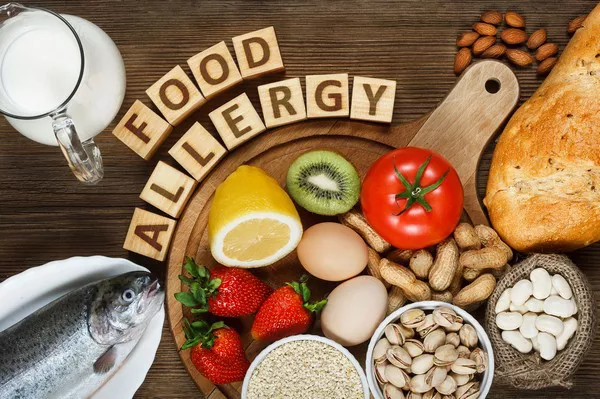Food allergies can trigger a wide range of symptoms, and while many people associate them with immediate reactions like hives or difficulty breathing, digestive issues such as gas can also be a significant concern. Excessive gas can be uncomfortable and even embarrassing, affecting one’s quality of life. In this article, we explore the relationship between food allergies and gas, discussing the causes, symptoms, and strategies to manage this common digestive problem.
Food Allergies: A Complex Web of Reactions
Food allergies occur when the immune system mistakenly identifies certain proteins in foods as harmful invaders. In response, the body releases chemicals like histamine, which lead to various allergic symptoms. While skin rashes, hives, or swelling are typical reactions, digestive problems like gas, bloating, and diarrhea can also manifest in some individuals.
The digestive system plays a crucial role in processing the foods we consume, and it’s not uncommon for food allergens to provoke gastrointestinal symptoms. Let’s explore how food allergies can contribute to excessive gas:
1. Inflammation of the Digestive Tract: When an allergenic food is ingested, the immune response can lead to inflammation of the digestive tract. This inflammation may disrupt the normal digestive process, causing symptoms like gas and bloating.
2. Dysbiosis of Gut Microbiota: Food allergies might alter the balance of beneficial and harmful microorganisms in the gut. This disruption, known as dysbiosis, can lead to increased gas production and changes in bowel habits.
3. Intestinal Permeability: Allergic reactions can damage the lining of the intestine, causing increased permeability or “leaky gut.” When the intestine becomes permeable, it allows molecules to pass into the bloodstream that would normally be confined to the digestive tract. This can lead to gastrointestinal symptoms like gas and bloating.
Common Gassy Culprits in Food Allergies
Several foods are more likely to cause digestive issues in individuals with food allergies. Some of these common triggers include:
1. Dairy Products: Dairy allergies, particularly lactose intolerance, can lead to gas, bloating, and diarrhea. People with lactose intolerance lack the enzyme needed to digest lactose, the sugar found in milk and dairy products.
2. Wheat and Gluten: Gluten intolerance, also known as non-celiac gluten sensitivity, can cause gas and bloating. While it’s distinct from celiac disease, this condition is marked by digestive symptoms triggered by gluten-containing foods.
3. Legumes: Some individuals experience gas and bloating due to allergies to legumes, such as beans and lentils. These foods contain complex carbohydrates that can be challenging to digest.
4. Sulfites: Sulfites are preservatives found in various foods and beverages, including dried fruits, wine, and processed foods. Sulfite sensitivity can lead to digestive symptoms, including gas.
5. FODMAPs: Fermentable oligosaccharides, disaccharides, monosaccharides, and polyols (FODMAPs) are certain types of carbohydrates found in various foods. FODMAP intolerance can result in gas and bloating, and it’s often associated with irritable bowel syndrome (IBS).
Differentiating Food Allergies from Food Intolerances
It’s important to distinguish between food allergies and food intolerances. While both can lead to digestive symptoms, their underlying mechanisms are distinct:
Food Allergies: Food allergies involve the immune system’s response to specific proteins in food. They can cause immediate and severe reactions, affecting multiple systems in the body. Gas and other digestive symptoms may occur, but they are typically accompanied by other allergic symptoms like skin rashes, itching, or respiratory issues.
Food Intolerances: Food intolerances, on the other hand, do not involve the immune system. They result from the body’s inability to digest certain substances, such as lactose or gluten. Symptoms like gas, bloating, and diarrhea are more likely to be isolated digestive reactions.
Managing Excessive Gas Caused by Food Allergies
If you suspect that your excessive gas is related to a food allergy, consider the following steps:
Identify the Allergen: Keep a food diary and consult with a healthcare provider to identify the allergen responsible for your symptoms.
Eliminate the Trigger Food: Once the allergen is identified, eliminate it from your diet. This may require significant dietary adjustments.
Consult an Allergist: If you suspect a food allergy, an allergist can perform specific tests, such as skin prick tests and blood tests, to confirm the diagnosis.
Consider FODMAPs: If your symptoms persist after eliminating common allergenic foods, you may want to explore the low FODMAP diet, which restricts specific carbohydrates known to trigger digestive symptoms.
Monitor Your Diet: Keep a close eye on your diet and symptoms. Gradually reintroduce foods after allergen elimination to observe any reactions.
Seeking Professional Guidance
Excessive gas can result from various factors, including food allergies. If you experience persistent or severe gastrointestinal symptoms, it’s essential to consult with a healthcare provider or allergist for a proper diagnosis. They can help identify the underlying cause and develop a personalized management plan to address your specific needs.
Conclusion
Excessive gas can be an uncomfortable and socially challenging symptom, especially when linked to food allergies. Understanding the relationship between food allergies and gas is the first step in managing and alleviating these digestive issues. By identifying trigger foods, seeking professional guidance, and making necessary dietary adjustments, individuals can regain control of their digestive health and overall well-being.

